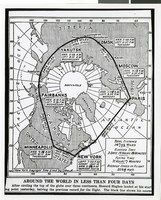"Access to archival materials stored in LASR may be limited at this time."
Search the Special Collections and Archives Portal
Hughes, Howard, 1905-1976
Description
American businessman Howard Hughes was born September 24, 1905 in Houston, Texas. Hughes' business career began when he gained control of Hughes Tool Company in 1924 at the age of 19, following his father's death. An indifferent student, he withdrew from Rice University, married Ella Rice and moved to Los Angeles, where he directed and produced a number of films including
Hughes was also an avid aviation enthusiast and in 1932 he formed Hughes Aircraft Company as a division of Hughes Tool Company to support his passion for flying. In 1935, he set the land speed record in his plane, the Hughes H-1 Racer. In 1937 Hughes, in a modified version of the Hughes H-1 Racer, set a new transcontinental airspeed record. The following year he completed a record-breaking flight around the world. During the Second World War, Hughes Aircraft Company won defense contracts to develop high-speed pursuit and reconnaissance aircraft and communication systems. In 1946, while flying the XF-11, an experimental prototype, Hughes almost died when the plane crashed. Undeterred, Hughes chose to fly another prototype the H-4, better known as the Flying Boat or 'Spruce Goose,' a gargantuan wooden cargo plane. In 1947, Hughes piloted the plane on its first and last flight, during which it traveled just one mile and never climbed more than 70 feet above Long Beach Harbor in California.
During this same period, Hughes appeared before the U.S. Senate to counter assertions that he was a war profiteer. In spite of aviation failures and senate investigations, Hughes Aircraft Company became a major innovator in radar, avionics, and missiles. However due to Hughes’ erratic management style, many key managers and executives resigned and threatened the ability of the company to fulfill its contracts with the U.S. Air Force. Threatened with having the contracts pulled, Hughes remove himself from active involvement with Hughes Aircraft. In 1953, he made the company a subsidiary of the Howard Hughes Medical Institute, a tax-exempt entity.
After Hughes Tool Company acquired a controlling interest in RKO Radio Pictures Inc. in 1948, Hughes became the head of one of the largest motion picture studios in Hollywood. By the early 1950s, the growing fear that Communists had infiltrated Hollywood forced Hughes to take action to root out Communists and their influence in his studio, or face condemnation by HUAC and the American Legions' Anti-Communist Crusade. Although on the periphery of the
On November 27, 1966, Howard Hughes moved to Las Vegas, Nevada, and took up residence on the top floor of the Desert Inn Hotel. Hughes purchased real estate in Las Vegas and started the Summa Corporation in 1972, as a holding company that managed Hughes' remaining investments and primarily developed and managed the Hughes real estate holdings on the west side of the Las Vegas Valley. After a number of abrupt moves to hotels outside the United States, Hughes died on April 5, 1976. Weeks after his death a handwritten will was found, known as the "Mormon Will" that gave over a billion dollars to various charities. The Nevada State Court declared the will a forgery in 1978.
Sources:
“Howard Hughes Biography.”
Nix, Elizabeth. “History stories: 7 Things you may not know about Howard Hughes.”
"Welcome Home Howard!"

